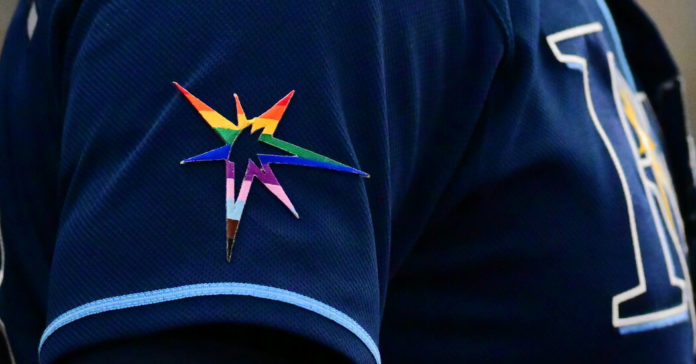
Something was missing in the top of the eighth inning on Saturday at Tropicana Field in St. Petersburg, Fla. The Tampa Bay Rays used two relief pitchers that inning — the left-handers Brooks Raley and Jalen Beeks — who wore jerseys without a patch on their right sleeve.
This was not a manufacturer’s error or an equipment manager’s mistake. The patch was the Rays’ starburst emblem rendered in rainbow colors, like the “TB” logo on the team’s cap, as part of the team’s Pride Night promotion. Raley, Beeks and a few other teammates chose to wear caps and jerseys without the rainbow accents.
Credit the Rays for trying. They are one of three teams, along with the San Francisco Giants and the Los Angeles Dodgers, to incorporate Pride Night symbolism onto their uniforms. But while the Giants and the Dodgers had full participation, the Rays did not.
The Tampa Bay Times listed five players — the other three, pitchers Jason Adam, Jeffrey Springs and Ryan Thompson, did not play in the Rays’ 3-2 loss Saturday to the Chicago White Sox — among those who did not wear the rainbow insignias. The team selected Adam, a 30-year-old right-hander, to explain the players’ decision.
“A lot of it comes down to faith, to like a faith-based decision,” he said. “So it’s a hard decision. Because ultimately we all said what we want is them to know that all are welcome and loved here. But when we put it on our bodies, I think a lot of guys decided that it’s just a lifestyle that maybe — not that they look down on anybody or think differently — it’s just that maybe we don’t want to encourage it if we believe in Jesus, who’s encouraged us to live a lifestyle that would abstain from that behavior.”
Adam added that “we love these men and women, we care about them, and we want them to feel safe and welcome here.”
On Being Transgender in America
In an interview on Sunday, Rays President Matt Silverman said the issue had sparked dialogue in the team’s clubhouse about valuing different perspectives.
“I’m proud of the fact we did this and so many of our players chose to wear the logo,” Silverman said. “I’m also proud of the conversations we had during the run-up to this night and in the aftermath. That’s a really good byproduct of this: to be able to actually have these conversations is really valuable and rare.”
As a low-payroll team that challenges convention, the Rays prioritize clubhouse harmony; without buy-in from players, their unorthodox on-field strategies might not work. The organization wanted to share its values with the uniforms, Silverman said, but would not force players to comply if they were uncomfortable.
Yet by allowing the players to opt out of the promotion — and to use the platform to endorse an opposite viewpoint — the Rays undercut the message of inclusion they were trying to send. Words like “lifestyle” and “behavior” are widely known tropes often interpreted as a polite cover for condemning gay culture.
The Rays held their promotion the day after the Dodgers had honored the memory of Glenn Burke, a former outfielder for the team who was the first major leaguer to have come out as gay, at the team’s LGBTQ+ Pride Night in Los Angeles. The resistance of some players in St. Petersburg — despite the Rays’ best intentions — showed how far the movement still has to go.
“When people use their interpretation of religion to justify discrimination against people for the way they were born, it’s really an indictment of them and their faith,” said the author Andrew Maraniss, who wrote a biography of Burke, who died in 1995, titled “Singled Out” that published last year. “Acknowledging that people are people and all fans are welcome, that’s not something you should be able to opt out of.”
Players have some leeway with on-field style — the length of their pants, the angle of their caps, the colors of their arm sleeves, and so on. But rarely are players given the choice of which cap and jersey they want to wear.
In 2016, when Chris Sale, a White Sox pitcher at the time, refused to pitch in a retro uniform the team was planning for his start — he said it was uncomfortable — he took scissors to the jerseys and destroyed them. The White Sox suspended him five games for insubordination and destruction of team equipment.
“While we all appreciate Chris’ talent and passion,” White Sox General Manager Rick Hahn said in a statement then, “there is a correct way and an incorrect way to express concerns about team rules and organizational expectations.”
While the situations are not analogous, the last part of Hahn’s statement seems to resonate here. By creating special uniforms for Pride Night, the Rays were expressing their beliefs as an organization. As the primary messengers for the franchise, the players should have been expected to reflect that position. If doing so made them uncomfortable, they could have been given the night off.
This should not obscure the admirable track record on social issues by the Rays, who have celebrated Pride Night for 16 years. In 2015, the Rays were one of three sports organizations — with the Giants and the N.F.L.’s New England Patriots — to sign an amicus brief filed to the Supreme Court in support of same-sex marriage. In 2016, after the mass shooting at Pulse, a gay nightclub in Orlando, Fla., the organization cut ticket prices for Pride Night and raised $300,000 for a victims’ fund.
Last month, the Rays joined with the Yankees to devote their social media feeds for one game entirely to facts about gun violence in the United States, rather than any information about the game. The Florida governor, Ron DeSantis, was already planning to veto $35 million in state funds to help the Rays build a new training center, but used the occasion to take a jab at the team.
“Companies are free to engage or not engage in whatever discourse they want, but clearly it’s inappropriate to be doing tax dollars for professional sports stadiums,” DeSantis said at a news conference last Friday. “It’s also inappropriate to subsidize political activism of a private corporation.”
All of this can be exhausting for fans who would rather take their sports without politics, yet an event like Pride Night should stand apart. It is meant to be a collective show of unity, without judgment, yet some players were allowed to send a different message.
In any case — if you believe in such things — karma got the last word on Saturday. The relievers in the standard-issue uniforms immediately gave up a two-run lead, sending the home team to defeat.







